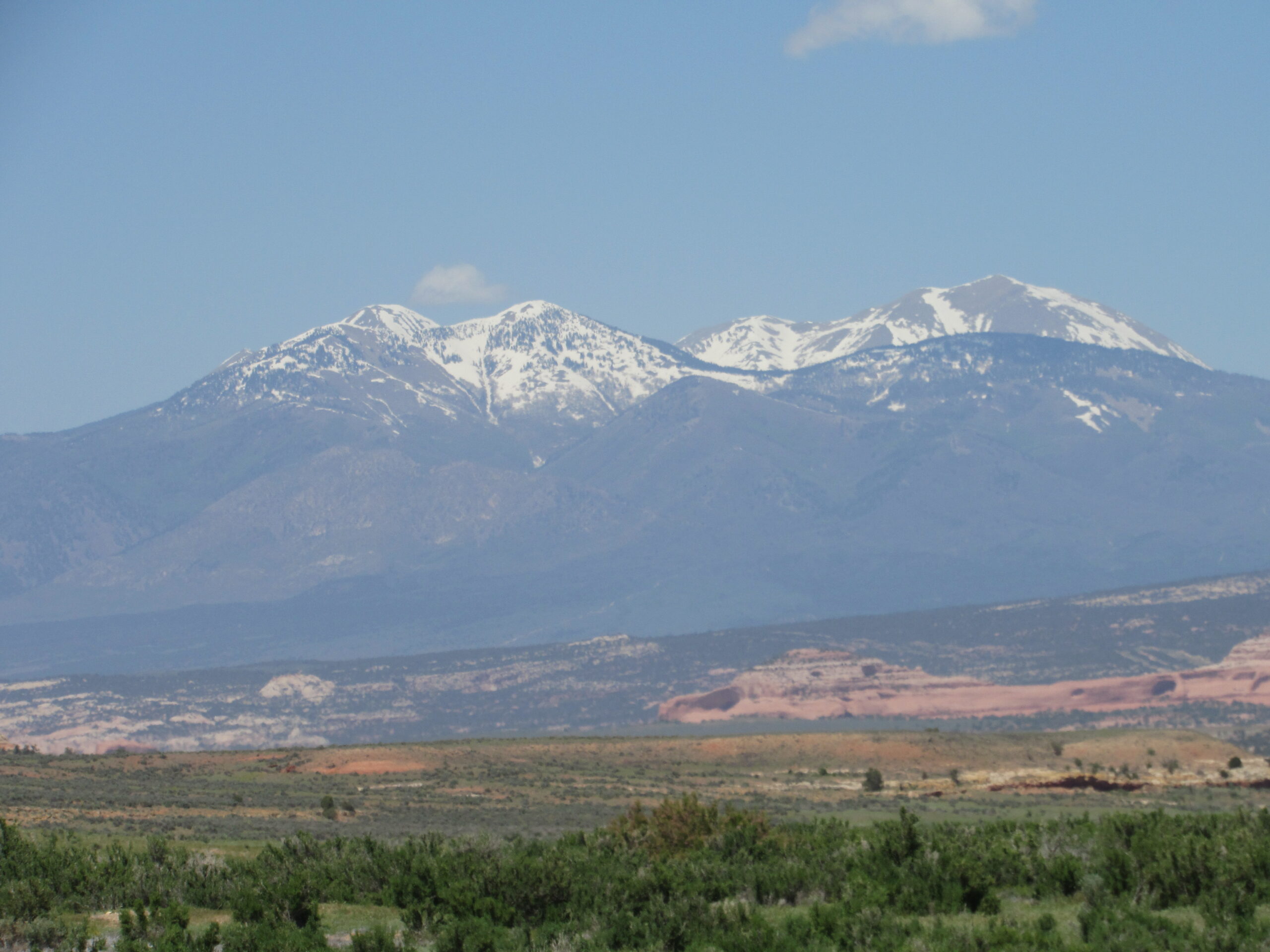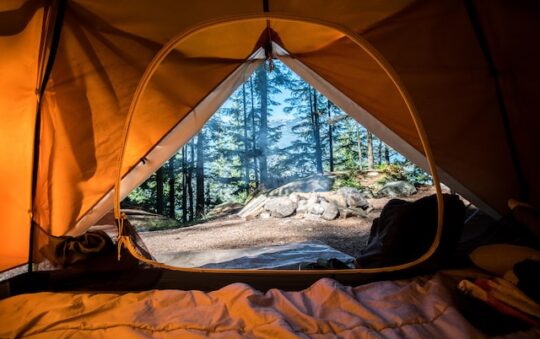Camping is a great way to get outdoors and enjoy nature, but camping safely can be a challenge for beginners. It’s important to recognize the potential dangers of camping in the wilderness or even an RV resort and to take steps to keep yourself protected. From understanding basic safety tips to knowing what supplies you need, this beginner-friendly overview will help you learn the basics of camping safely so that you can have an enjoyable outdoor experience!
Things to keep in mind for camping safely
When you go camping in an RV or even a tent, there are a few safety things you need to keep in mind. First and foremost, always make sure the campground is reputable and safe. Look for a campground that has plenty of security, like cameras and security patrols. Make sure your RV is parked in a well-lit area, especially at night. And be aware of your surroundings; if something doesn’t feel right, it probably isn’t. Camping in a recreational vehicle (RV) is an enjoyable way to explore nature and spend some quality time with your family and friends. However, it’s important to ensure that you take the necessary precautions to stay safe while on your outdoor adventure.
Research Ahead of Time

Before heading out on any RV trip, make sure you do some research ahead of time so you know what type of terrain you’ll be driving through along with what types of facilities are available at each campsite such as electrical hookups or showers etc… This will help ensure that you are prepared for anything that may arise during your trip.
Campsite Selection is Important
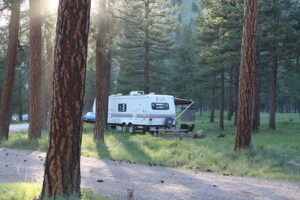 When selecting campsites for overnight stays they must provide ample space for parking an RV safely. Check for the level ground so that your vehicle won’t tilt or become unstable during sleep times when people are inside their RVs during windy conditions or storms with heavy rainfalls; stability helps protect against accidents occurring due to shifting weight distributions inside cabins. Additionally, look out for low-hanging tree branches which could damage your roof if not avoided in advance; watch out for bumps that could puncture tires; avoid setting up camp near bodies of water which could lead to flooding; and never park close to cliffs which pose extreme risks even if they seem stable initially upon inspection but may weaken over time due to erosion caused by natural elements such as rainwater dripping down slopes into soil beds below creating sinkholes over extended periods without prior warning signs from Mother Nature given ahead of time before arriving at a potential campsite location beforehand!
When selecting campsites for overnight stays they must provide ample space for parking an RV safely. Check for the level ground so that your vehicle won’t tilt or become unstable during sleep times when people are inside their RVs during windy conditions or storms with heavy rainfalls; stability helps protect against accidents occurring due to shifting weight distributions inside cabins. Additionally, look out for low-hanging tree branches which could damage your roof if not avoided in advance; watch out for bumps that could puncture tires; avoid setting up camp near bodies of water which could lead to flooding; and never park close to cliffs which pose extreme risks even if they seem stable initially upon inspection but may weaken over time due to erosion caused by natural elements such as rainwater dripping down slopes into soil beds below creating sinkholes over extended periods without prior warning signs from Mother Nature given ahead of time before arriving at a potential campsite location beforehand!
Ensure you have the proper gear for your trip
Having the proper camping gear is essential to camping safely and successfully in your RV. Before you set off on your camping trip, make sure you have everything you need for a comfortable experience. Start with the basics: camping tent/canopy (if you plan on sleeping outside of your RV), sleeping bags/mats/pads, camping chairs, camping stove or grill, flashlights, camping lanterns, camping cookware and utensils, a first aid kit, insect repellent, camping toiletries and hygiene items. You’ll also want to bring extra clothes appropriate for the weather conditions and extra blankets or sleeping bags.
You might want some other emergency gear
Additionally, it’s important to equip yourself with emergency supplies like water purification tablets, tool kits (screwdrivers, pliers, etc.), jumper cables, and car battery booster cables in case your RV or your toad has mechanical difficulties. Having extra fuel canisters is also wise as some campgrounds don’t always have them available.
Think about where you are going camping
Depending on where you are camping in your RV will determine what other gear should be brought along for safety purposes. If you’re planning on doing any kind of outdoor activity during your trip—such as hiking or kayaking—you’ll need additional items like backpacks with storage compartments for food and water bottles; sunblock; hats; sturdy shoes; trail maps; satellite phones if cell service is limited; binoculars; whistles for emergencies; bear spray if necessary!
Check the Weather Conditions for Camping Safely
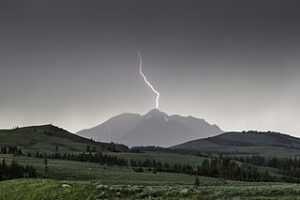
Before you set off, check the weather conditions of your location so that you can ensure you are camping safely. This includes checking for any extreme weather conditions such as heavy rain or thunderstorms that could make camping dangerous. If storms are forecasted, consider altering your plans or postponing your trip until the weather passes.
Check Your RV Regularly
After you check the weather, important to make sure that all systems in the RV are functioning correctly such as brakes, tires, lights, and water hoses. Regularly check these items throughout your trip for any damages or signs of wear and tear that could affect your ability to safely drive the vehicle or even put you at risk when stopped for long periods.
Have a Communication Plan to Ensure you are Camping Safely
It’s important to have a communication plan and your family is aware of procedures to keep track of one another and make contact if needed during an emergency or if you get separated from each other. Familiarize yourself with local cell service coverage so that you can stay connected while away from your site or keep a walkie-talkie nearby with fresh batteries just in case there is no cell service available.
Avoid Areas With Limited Visibility
When deciding where to park for the night, avoid areas with limited visibility such as thick forests if you are concerned about camping safely. These areas could potentially increase safety risks associated with certain animal species possibly lurking nearby. Always be sure to check the camping zones around you for any signs of wildlife activity before setting up camp. Make sure to check a potential site for any hazardous debris or potentially dangerous items that may have been left behind before settling down for the night.
Secure Your Belongings
Once you have arrived and set up, make sure all belongings are secured in the RV when not in use as items left outside can get easily misplaced or stolen. Invest in a good lock for the doors of your RV if possible and consider storing valuable items such as wallets, phones, laptops, and jewelry inside when leaving the vehicle unattended. It may also be a good idea to invest in a safe for your recreational vehicle.
Beware of Wild Animals
Depending on where you choose to camp, there may be wild animals roaming around near your campsite so it’s important to remain aware of this potential hazard while outside or even inside your RV at night time when they might be more active than usual. Make sure food scraps are properly disposed of and invest in bear-resistant containers if needed for food storage purposes outdoors during camping trips in certain locations with higher wildlife activity rates such as national parks or forests.
Always supervise young children
Even if there don’t seem to be any immediate threats nearby, a good rule of thumb for camping safely is to always remember to never leave small children unsupervised. Always be aware of the outdoor areas where wild animals may be present nearby due to potential risks associated with their presence. The last thing you need to spoil your trip is having a member of your family getting bitten by venomous snakes or other animals, or being attacked by predators. Be sure to have a flashlight handy, so you can conduct searches of dark areas if necessary.
Have a First Aid Kit On Hand
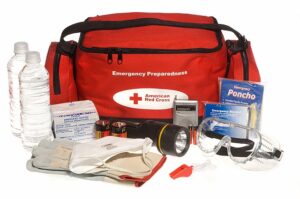
Having a fully stocked first aid kit with all the necessary items for treating minor injuries or illnesses is essential when RV camping. Make sure to include a variety of over-the-counter medication such as ibuprofen, acetaminophen, and antihistamines; bandages, gauze, and medical tape; antiseptic wipes and ointment; sterile gloves; tweezers; insect repellent; sunscreen and aloe vera lotion; and scissors. You should also make a habit of checking supplies regularly and replacing any used items to ensure the kit’s contents remain up-to-date.
Be Mindful Of Fire Precautions

Fire safety is one of the most important aspects when camping in an RV. Open fires provide both warmth & light but also come along with various dangers including smoke inhalation and unintentional damage through unnoticed flames spreading onto surrounding trees & plants when least expected. Be sure to always have a fire extinguisher handy, and make sure your camping area is free from any flammable materials for the duration of your camping experience. Be sure to always extinguish any fire completely before leaving your campsite area for other destinations.
Invest in Smoke Detectors
Smoke detectors should be installed in your RV and checked periodically to ensure they are in working order. If a fire is detected, these devices can help alert you and other campers of potential danger and give you time to evacuate the area quickly. You should also install carbon monoxide detectors as this dangerous gas can build up without being visible or smelt and cause serious health issues if not removed from the environment quickly.
Follow All Local Rules & Regulations
Whenever entering a new campground or area with specific rules regarding camping activities, always read through all regulations carefully before engaging in any activities. If required, always carry valid documents such as appropriate licensees, registrations, and other required identification.
Stay Connected With Others
While out camping away from home it’s essential to stay connected with family & friends back home. There are various communication methods available such as mobile phones with data plans or portable satellite dishes providing internet. These communication methods allow you to keep in contact in case of an emergency and let your loved ones know you are safe during your camping experience.
Having a fully stocked first aid kit with all the necessary items for treating minor injuries or illnesses is essential when RV camping. Make sure to include a variety of over-the-counter medication such as ibuprofen, acetaminophen, and antihistamines; bandages, gauze, and medical tape; antiseptic wipes and ointment; sterile gloves; tweezers; insect repellent; sunscreen and aloe vera lotion; and scissors. You should also make a habit of checking supplies regularly and replacing any used items to ensure the kit’s contents remain up-to-date.
Secure Your Food & Trash
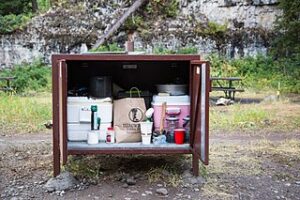
As tempting as it may be to leave food out while camping, especially on hot days when food smells attract animals like bears, it’s important to properly store all snacks and meals inside sealed containers either your RV or secured in metal boxes away from your campsite at all times. Additionally, never leave trash out in the open, as this too can attract unwelcome visitors which can prove dangerous for both them and you! Make sure all garbage is securely stored away until it can be disposed of at designated trash sites during your travels.
Related Article: RV Mistakes to Avoid at all Costs
Don’t forget about your pets
When camping, it’s important not to forget about pet safety. Animals of all shapes and sizes can be prone to accidents and dangerous illnesses when venturing outdoors for extended periods. Let’s learn a few ways to keep your furry friends safe when out in your RV.
Keep your pet leashed
First and foremost, make sure your pet remains leashed at all times when camping. This will help ensure they don’t wander off into areas where they may encounter danger or become lost. Additionally, remember to bring plenty of water and other supplies such as food dishes, and blankets as this will help keep them hydrated and comfortable during their camping trip too! If camping in cold temperatures, consider bringing a jacket or sweater for your companion as well since animals can get just as chilly as humans do.
Check your site for hazards to your furry friends
It is also essential to check the campsite beforehand for any potential hazards that could harm your pet such as poisonous plants or sharp objects that could cause injury; likewise, have flea and tick medications on hand (if applicable) so you can treat any bites or infestations immediately after discovery. Be sure to inspect your pet regularly for ticks or fleas during camping trips too; some pets are more prone than others to pick up these pests due to being closer to the ground compared with humans so it’s always wise to practice taking preventive measures against possible health risks which may arise from exposure outdoors in unfamiliar environments filled with plenty of unknown variables throughout each camping day out!
Finally, make sure you take regular breaks throughout the day for your pet(s) so they can explore their surroundings safely and enjoy their camping experience just as much as you do!
Try not to camp alone
Remember that no one should ever go camping alone – having at least one companion who can lend assistance in case something goes wrong is essential for keeping safe out there in nature’s wilderness! Consider investing in GPS devices with built-in satellite tracking capabilities just in case someone gets lost – having access to real-time location data can prove invaluable should rescue personnel need quick access to find those who wander off the path accidentally deep within unknown terrain!
Wrapping up your camping trip
When returning from an RV camping trip, safety is something that we still should all be cognizan of. When finishing up your trip on departure day, make sure that all camping equipment and other belongings are packed up properly and securely. You should check for any leftover food, garbage, or debris that may have been left behind so that these can be disposed of in designated areas or brought home with you safely.
Check your RV again
As a reminder, it is important to inspect the vehicle for any damage or leaks which may have occurred during your camping trip. Also inspect any furniture, appliances, and camping accessories such as tents or camping lamps to ensure they remain in good condition before being stored away.
Related: Cleaning RV Water Lines
When you get home
When unloading your items back into your home be sure to handle them with care; also make sure you don’t overcrowd the RV when packing up because this can lead to items being damaged by shifting around during transport back home. It is also best practice to thoroughly clean and disinfect any camping supplies which were used outdoors since there could be potential exposure to dangerous contaminants from the environment which need attention post-trip. This includes cleaning out coolers where perishable food may have been stored as well as washing off camping utensils and cooking equipment before returning them indoors.
Additionally, you should take stock of any outdoor clothing which was worn during your camping trip; you will want to launder those items separately from other laundry due to potential exposure to dirt and grime collected while at the campsite!
After your camping trip
After camping, it is important to think about what you learned. Make sure to know the dangers and how to stay safe when camping. Keep your pet leashed and check for possible hazards like poisonous plants or sharp objects. Don’t forget about things like flea and tick medications, extra water, food dishes, blankets (for cold temperatures), and GPS devices with built-in satellite tracking capabilities in case someone gets lost.
Why Camping Safely is Important
As you can see, camping safely is an important consideration when embarking on any outdoor adventure. Taking the necessary precautions will help ensure the safety and health of you and those around you. Keeping food protected and stored properly in sealed containers away from wild animals is always important. Be sure to keep up with weather forecasts so that you can remain prepared for potentially hazardous conditions that may arise and always have a first aid kit on hand just in case something happens. Ultimately, careful planning and proper execution can pay off when it comes to camping safely.
So now, we’d love to know: do you have any other tips to recommend to our readers for camping safely? Share your thoughts in the comments below!



